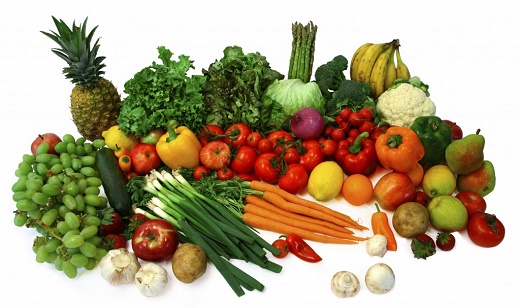On the other hand, a number of studies show that people, young and old, who eat more vegetables and fruits have better emotional stability and more happiness, along with less stress and anxiety. Recent research has also demonstrated that antioxidants — abundant in many plant-based foods — can promote emotional well-being.
One 2013 study, published in theBritish Journal of Health Psychology, examined the relationship between diet and mood in 281 young adults. In this study, participants who ate more fruits and vegetables felt calmer, happier and more energetic, leading the researchers to call for further studies to explore these connections.
A much larger study, published late 2012 in the journal Social Indicators Research, examined the diets of 80,000 people in Britain. Results showed that happiness and emotional well-being were “dose dependent” on the amount of vegetables and fruits people ate, suggesting that emotional well-being peaks with seven servings of fruit and/or vegetables a day. Measurable indicators included self-reported life satisfaction, mental well-being, happiness, nervousness and others.
Apparently, seven daily servings is the magic number of fruits and vegetables you need to consume in order to reach a greater plateau of mental and emotional wellness, say the authors of this study. However, this level of wellness likely can be surpassed to bring even greater health and happiness, if you combine good-mood foods with other measures such as regular exercise, mind-body practices and targeted natural supplements.
Good Mood Super-Foods
If you eat the right foods, you can go a long way in boosting your mental, emotional and overall physical health and wellness. The whole foods I describe below are rich in antioxidants, minerals and nutrients to support relaxation and boost mental clarity and happiness. They also support numerous other areas of health in the process.
Greens
Leafy greens, like spinach, beet greens, collards and kale, are loaded with nutrients that the brain and body love. In particular, these foods contain copious amounts of magnesium (spinach is a good example), which is essential in promoting relaxation and helping the brain to increase GABA activity. (GABA is a neurotransmitter involved in relaxation and stress relief.)
Greens also contain B vitamins and folate, which are essential in managing stress. Microalgae like spirulina are also considered green foods because of their high chlorophyll content. Spirulina contains a good percentage of stress-busting vitamin B-12 as well as protein and minerals; and it helps to balance blood sugar, an essential in promoting a healthy mood.
Cruciferous Vegetables
Cruciferous vegetables, particularly broccoli, are some of the most nutrient-dense vegetables. They contain a number of active compounds that promote many areas of health, including mental and emotional well-being. Cabbage contains tryptophan and selenium (along with numerous other phytonutrients), which help relax and support a healthy mood. Broccoli is high in vitamin C, which helps combat the effects of increased cortisol. Furthermore, these vegetables are excellent detoxifiers and contain an abundance of antioxidants to help promote long-term physical, mental and emotional wellness.
Avocados
Avocados are nutritional superfoods. Packed with healthy mood and brain-supporting fats, protein, vitamin B-6 and folate, avocados support numerous areas of health, including a balanced mood. Avocados also contain tryptophan, which helps promote healthy relaxation and helps create the mood-boosting neurotransmitter serotonin.
Asparagus
This long, stalky vegetable is a top source of tryptophan. It also contains folic acid, another important mood-boosting nutrient that plays numerous critical roles in health. In addition, asparagus is a source of vitamins A, B6, C, K, thiamine, zinc and beta carotene. When you eat asparagus, you also get glutathione, a key nutrient for anti-inflammatory and detoxification functions.
Coconut
Today, you can purchase numerous coconut-based products, including coconut milk, kefir and coconut butter. As more and more people discover coconut as a source of healthy fat and unique nutrients, they’re often surprised at the noticeable boost in their emotional well-being. Coconut’s medium-chain fatty acids help support brain health and a better mood. Many people report a rapid mood-enhancing effect even after eating just a spoonful of coconut oil.
Botanicals
An excellent way to support relaxation and a healthy mood is with the botanical, purified honokiol extract. Honokiol is an ingredient isolated from magnolia bark, an ancient staple of traditional Chinese herbalism. Traditionally used to address anxiety, pure honokiol works to support a healthy mood, in part, by helping to regulate GABA production. It’s also a powerful antioxidant that crosses the blood/brain barrier to support cognitive function in numerous ways. At higher doses, it’s a powerful cellular health agent, helping to promote optimal cell function and reduce inflammation throughout the body.
Intimate Connections
Physical health and mental/emotional health are intimately connected. As your body becomes stronger and healthier — with the right anti-inflammatory foods, lifestyle habits and targeted natural supplements — happiness, relaxation, brain function and vitality increase as well. Overall, these self-care practices help nourish the positive outlook and energy you need to optimize health and wellness for life.
Book your Holiday Here




